Wrong Year? 1953 MG TF
The seller lists this MG TF project car as a 1953 model, but I believe that might be incorrect. A check of the vehicle’s details suggests it could be a 1954 model, although that potential discrepancy could be the least of the buyer’s problems. It has fallen on hard times, and returning it to its former glory will represent a significant undertaking. If you feel up for that challenge, you will find the TF listed here on Craigslist in York, Pennsylvania. Taking this classic home will cost the new owner $5,900, and I must say a big thank you to Barn Finder T.J. for spotting this intriguing sports car.
Okay, let’s get down to the question of the production year for this little TF. The company built its first production TF in September 1953, finding its first buyer the following month. The ID Plate on our feature car tells much of the story because it carries Car No. 2092. The first production example was No. 501, and with around 6,200 vehicles produced between September 1953 and mid-1954, that suggests this car probably emerged in early January 1954. It’s a close call, and I am willing to give the seller the benefit of the doubt. Looking beyond that question, there’s a lot to absorb with our feature car. Its panels show traces of its original Almond Green paint, with production figures indicating that 1,528 buyers selected that shade. The only rarer color was Birch Grey, with a total of 1,219 cars. Sadly, it is being rapidly consumed by corrosion and penetrating rust, which has impacted every panel. Reproduction parts are readily available, but the buyer will undoubtedly decide to inspect the frame thoroughly before committing their cash to ensure it has nothing beyond surface corrosion. This will be particularly important around the mounts because repairs to that aspect of this vehicle require the attention of an expert on safety grounds. Most trim pieces have lost their chrome, the windshield and frame are gone, and the wire wheels may be beyond salvation.
If buyers ordered their MG TF in Almond Green, they were limited to interior trim in Green or Biscuit. What remains of the upholstery is the correct color, but it isn’t original. The interior is another aspect that will generate a long shopping list. The buyer could potentially salvage the gauges and seat frames, but the rest appears destined for the trash. Top of the list will be a trim kit, which will lighten their wallet by $2,000. They can add a further $350 for a reproduction “banjo” wheel before setting aside some petty cash for smaller trim items, knobs, and handles. A budget of $3,000 should return the interior to a pristine state. Still, it’s worth noting that the original purchase price and interior retrim will have pushed the total to nearly $9,000 before we’ve considered the cost of the previously mentioned panel and paint restoration, or reviving what we’re about to find under the hood!
MG TF buyers received a single drivetrain combination, with early vehicles like our feature car rolling off the line powered by the 1,250cc XPAG four-cylinder unit producing 54hp. The power fed to the rear wheels via a four-speed manual transmission, and thanks to an overall weight of 2,020lbs, the TF could cover the ¼-mile in 20.9 seconds. Some readers will read that figure and feel underwhelmed, but it is worth placing it in context. The TF’s natural environment is not the drag strip but running free on the open road. Straight bitumen is fine, but when you add a few bends, these classics genuinely shine. They are engaging and rewarding, and the close proximity to the road makes these cars feel significantly faster than the speedometer or stopwatch suggests. That experience could await this car’s new owner, but they may require patience to achieve it. The vehicle doesn’t run, and the engine bay presentation suggests it has been decades since that little four fired a shot in anger. If the engine turns freely, it could be a candidate for revival or a rebuild. If it’s locked, that might spell trouble and add to the ballooning restoration budget.
Verifying the production year for this MG TF could be the starting point on a very long road to return it to its rightful place on our streets. It is unlikely to be easy and won’t be cheap. That begs the question of whether it’s justified. Only an in-person inspection would confirm its potential and much rides on the frame’s structural integrity. If rust has compromised that, it’s “Game Over” for his classic. The other factor that may play on the minds of buyers is that the market is currently awash with spotless TFs selling for below $25,000. Considering the required work and the cost of parts alone, the restorer must achieve perfection to pass that figure. That approach could net a value of $32,000, but conditions need to be favorable to realize that number. I feel the seller may be optimistic with their price, but do you agree?
Auctions Ending Soon
 1969 Ford MustangBid Now1 days$800
1969 Ford MustangBid Now1 days$800
 1965 Ford Falcon Station WagonBid Now4 days$2,300
1965 Ford Falcon Station WagonBid Now4 days$2,300
 2002 Jaguar XK8 ConvertibleBid Now5 days$3,500
2002 Jaguar XK8 ConvertibleBid Now5 days$3,500
 1979 Chevrolet Camaro Z/28Bid Now6 days$1,500
1979 Chevrolet Camaro Z/28Bid Now6 days$1,500
 1960 Dodge D300Bid Now6 days$100
1960 Dodge D300Bid Now6 days$100
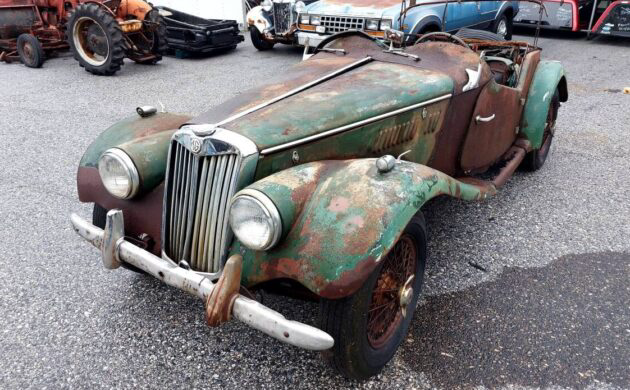
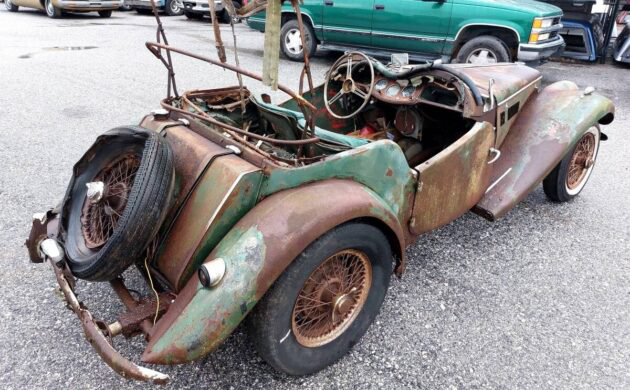
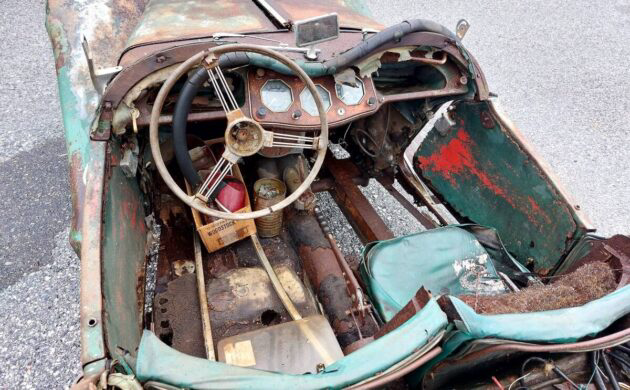
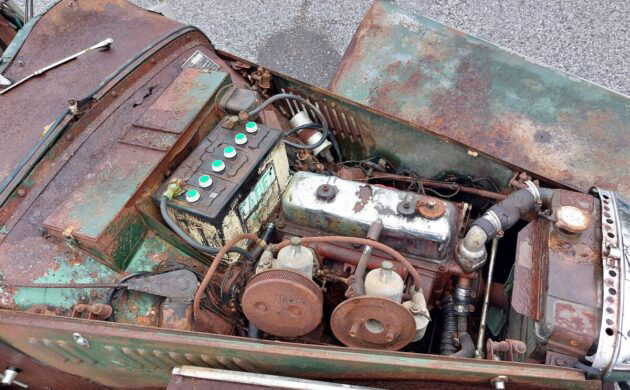
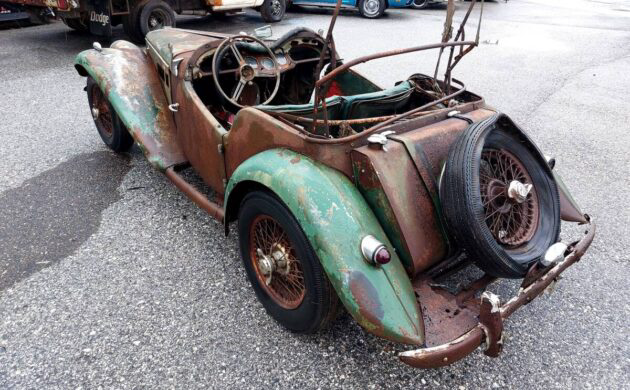

Comments
It’s a November/December 1953…
Parts car. That rust ain’t gonna buff out.
Make a $32,000 car out of this?? Easy, just spend $50,000+ !!
Plenty of ventilation thru boards!
Parts only, maybe $1500
Another seller with dreams of getting rich. Unfortunately this one might break the bank to restore. If some one is looking for a sports car to keep, then it might be worth restoring. If you plan on restoring this one, it is going to need to do a frame off restoration. Finding a source of sheet metal could really be fun.
Very close relationship between restoration and reincarnation on this car. On the money George.
Tons of parts are available for T series MGs. You could build a brand new one with aftermarket parts.
These cars and TD’s routinely sell from$12k to $25k in very usable condition. This one ? Priceless.
I am a person who has always wanted a “TF” MG… and I was disheartened to see this one in such a sad state. It’s basic “bones” are most likely also deteriorated, possibly to the point of potential catastrophic failure. That said, this vehicle could be brought back only by a new owners “act of love” for this model of MG. As for a “parts car”… most of the desirable parts have gone past being able to be sold for any sort of profit at that purchase price of $5,000. If it could be had for $500, a lover of the TF may take on this labor of LOVE!
December 29, 1953.
A TF1250 had an XPAG/TF engine that produced 57-58HP, and the car weighed closer to 1850#.
The tin worm has had its way with this car, it is too far gone to restore, and will have very limited parts value. The fenders are about the only body part worth saving, and may be badly rusted at the attaching points – it’s impossible to see.
Now, if it were a 1500, the engine alone would be worth it, but it’s a 1250.
Chassis No. TF2092
Original Engine No. XPAG/TF/31945
Build Date 29/12/1953
Production Car No. HDE43/2092
Don’t mess with the 1250, if you’re gonna bring it to life, use a Volvo B18 or B20 with OD, used to be a rather common upgrade. MGA or B axles, suspension & brakes and you have a very fun car that will keep up with Healeys and TR3s & 4s – cruise all day at 70 and be very agile in the canyons.
70? Not that rust bucket, you wouldn’t…
I’ve had two TDs, and a number of other MGs. See those big holes in the floor? Here’s how you restore this car. Start pouring hundred dollar bills in those large holes in the floor. When the pile of bills gets higher than the car, you might be close to getting done. Taking a Moss Motors catalog, you would probably need one of everything in the catalog. That’s the easy part. Now, source the NLA parts. Oh yaw . . . almost forgot: labor.
The Mark II that sold for $3,900 the other day would be a MUCH better candidate – minimal rust and everything is there. Still needs everything, but a MUCH more solid platform.
Always sad to see a once proud and fun car reduced to a state like this. Having said that, the TF never appealed to me because of its stop gap status. Looks like a stiff breeze will turn this example to dust. As I commented on a TD here, once the Swiss cheese sheet metal has been peeled away, you’re probably looking at a beyond repair wooden frame. Every single mechanical part will be a seized and unusable lump of corrosion. Good luck trying to seal up that fuel tank too. I’ve seen more valuable cars dissolving into the mud of a scrap yard. Just hold a funeral for this carcass.
sis got 1 in late ’60s. I swear it gained the same price then as now, no change in 40 yrs. THAT’s a part deffinition of ‘classic’ (very long term ownership, highly desirable at time made, etc)
Days gone by not worth restoring